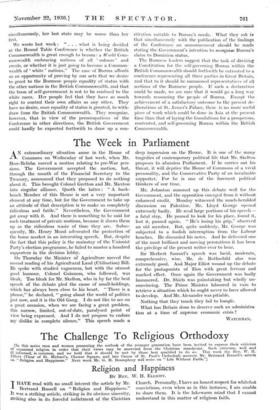The Week i n Parliament
AN extraordinary situation arose in the House of Commons on Wednesday of last week, when Mr. Hore-Belisha moved a motion relating to pre-War pen- sions. The Government accepted the motion, but, through the mouth of the Financial Secretary to the Treasury, announced that they proposed to do nothing about it. This brought Colonel Gretton and Mr. Maxton into singular alliance. Quoth the latter : " A back- bench Member of this House is not a very important element at any time, but for the Government to take up an attitude of that description is to make us completely ridiculous and futile." Nevertheless, the Government got away with it. And there is something to be said for such treatment of private motions, because it shows them up as the ridiculous waste of time they are. Subse- quently, Mr. Henry Mond advocated the protection of the home market in an interesting speech. But, despite the fact that this policy is the mainstay of the Unionist Party's election programme, he failed to muster a hundred supporters in the division lobby.
On Thursday the Minister of Agriculture moved the second reading of his Agricultural Land (Utilisation) Bill. He spoke with studied vagueness, but with the utmost good humour. Colonel Guinness, who followed, was bleak. Too bleak for Mr. Skelton, who in by far the best speech of the debate pled the cause of small-holdings, which has always been close to his heart. " There is a phrase," he declared, " going about the world of politics just now, and it is the Old Gang. I do not like to see on a great occasion, when we are facing a great problem, this narrow, limited, out-of-date, paralysed point of view being expressed. And I do not propose to endure my dislike in complete silence." This speech made a deep impression on the House. It is one of the many tragedies of contemporary political life that Mr. Skelton proposes to abandon Parliament. If he carries out his threat, it will deprive the House of Commons of a vivid personality, and the Conservative Party of an invaluable supporter. For he is one of the foremost political thinkers of our time.
Mr. Johnston summed up this debate well for the Government, and the opposition emerged from it without enhanced credit. Monday witnessed the much-heralded discussion on Palestine. Mr. Lloyd George opened extremely badly. He read large portions of his speech— a fatal step. He paused to look for his place, found it, lost it, paused again. " He's losing his grip," observed an old member. But, quite suddenly, Mr. George was subjected to a foolish interruption from the Labour benches. He discarded his notes. And he delivered one of the most brilliant and moving perorations it has been the privilege of the present writer ever to hear.
Sir Herbert Samuel's speech was lucid, moderate, comprehensive, wise. Mr. de Rothschild also was extremely good. And Major Elliot wound up the debate for the protagonists of Zion with great fervour and marked effect. Once again the Government was badly hammered. Dr. Shiels was painstaking but wholly un- convincing. The Prime Minister laboured in vain to retrieve a situation which he ought never to have allowed to develop. And Mr. Alexander was pitiable.
Nothing that they touch they fail to bungle.
What has Britain done to deserve such an admiiistra• tion at a time of supreme economic crisis ?
WATCHMAN.


















































































 Previous page
Previous page